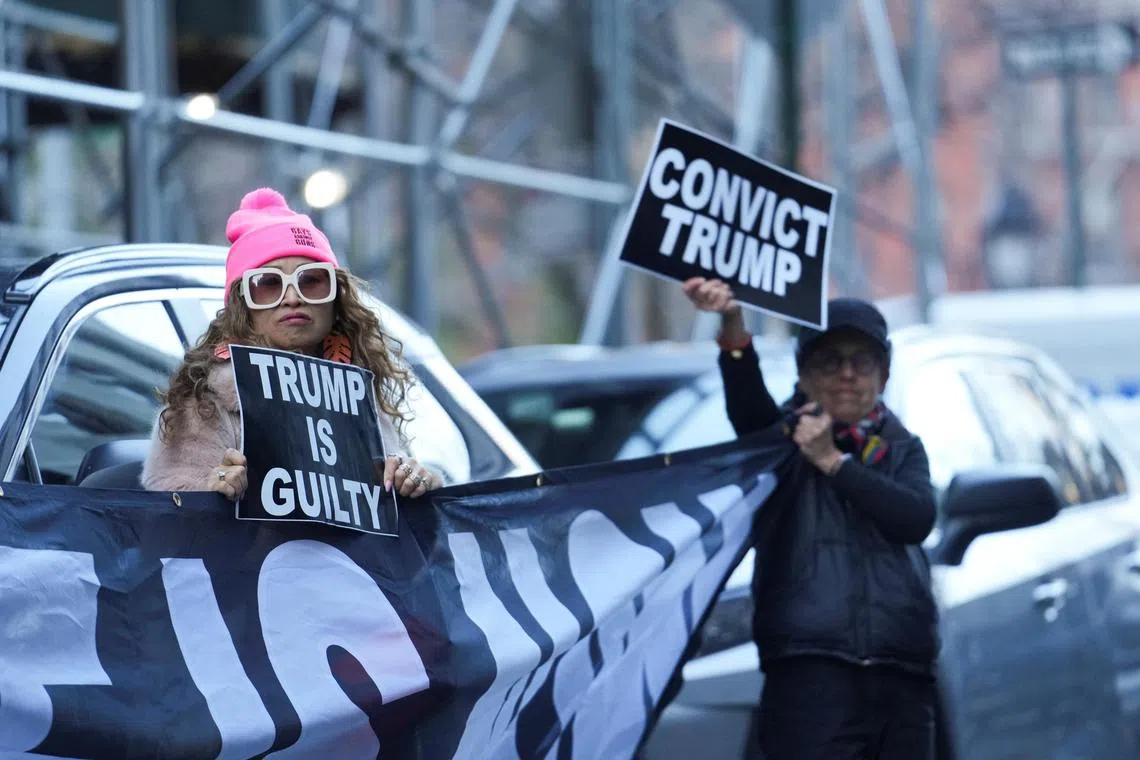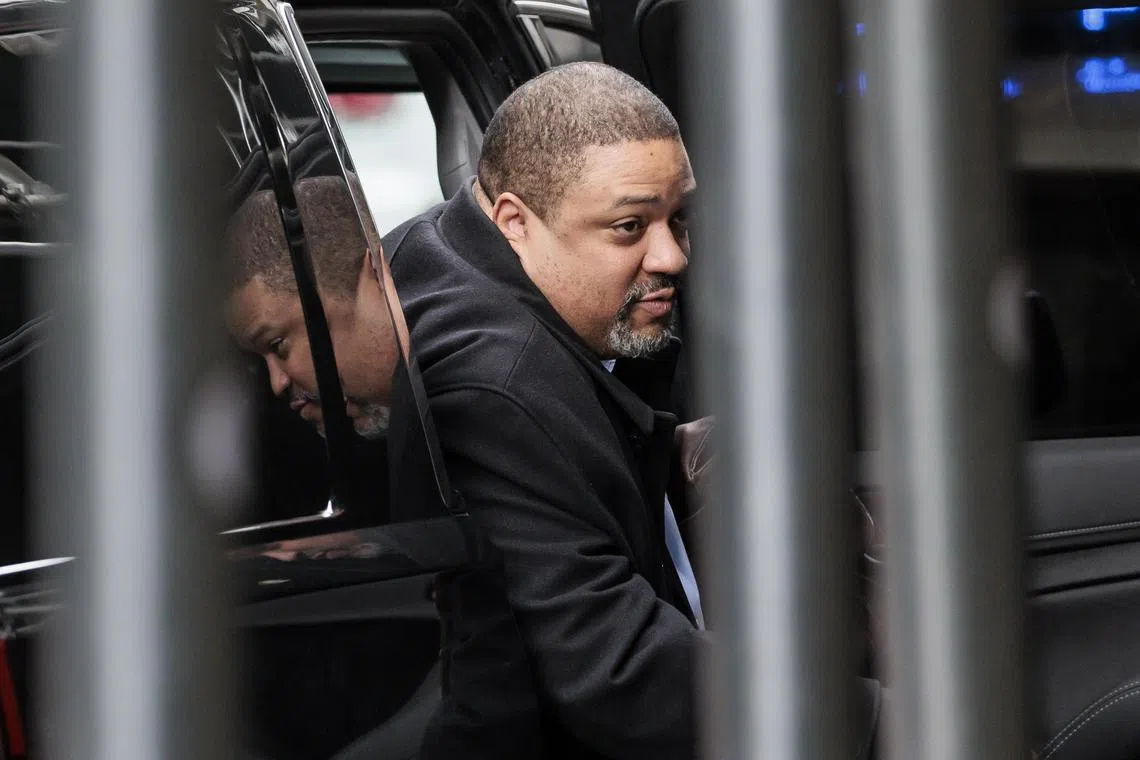Here are the key events that led to the grand jury vote to indict Donald Trump
Sign up now: Get ST's newsletters delivered to your inbox

Anti-Trump protesters hold signs outside Manhattan Criminal Court after former US President Donald Trump's indictment, in New York City, on March 30, 2023.
PHOTO: REUTERS
Follow topic:
NEW YORK - The investigation by the Manhattan district attorney’s office into Donald Trump’s hush money payments to porn star Stormy Daniels,
Here are some key moments:
Aug 21, 2018
Michael Cohen, previously a personal lawyer and fixer for Trump, pleads guilty to federal crimes and tells a court that Trump had directed him to arrange hush money payments to two women. The payments were made during the 2016 campaign to keep the women from speaking publicly about affairs they said they had conducted with Trump.
Soon after Cohen’s admission, the Manhattan district attorney’s office opens an investigation to examine if the payments broke New York state laws. The office soon pauses the inquiry at the request of federal prosecutors, who are looking into the same conduct.
August 2019
After federal prosecutors say they have “effectively concluded” their investigation, Mr Cyrus Vance Jr, the Manhattan district attorney at the time and a Democrat, revives his own inquiry.
Late in the month, prosecutors in his office issue a subpoena to the Trump Organisation and another subpoena to Trump’s accounting firm, demanding eight years of Trump’s personal and corporate tax returns.
Sept 19, 2019
Trump’s lawyers sue to protect his tax returns.
The lawsuit, filed in US District Court in Manhattan, argues that a sitting president cannot be criminally investigated. It leads to a lengthy delay.
July 9, 2020
After appellate judges rule against Trump, the lawsuit finds its way to the United States Supreme Court, where the justices rule that the presidency does not shield Trump from criminal inquiries and that he has no absolute right to block the release of his tax returns.
The ruling leaves Trump with the opportunity to raise different objections to Mr Vance’s subpoena.
Autumn of 2020
The investigation intensifies as prosecutors interview employees of the main bank and insurance company that serve Trump and issue several new subpoenas.
The district attorney’s office also signal in another court filing that it has grounds to investigate Trump for tax fraud.
Feb 22, 2021
The Supreme Court denies Trump’s final bid to block the release of his returns.
The brief unsigned order is a decisive defeat for Trump and a turning point in Mr Vance’s investigation.
Just hours later, eight years of financial records are handed over to Mr Vance’s office.
March 1, 2021
The investigation’s focus turns to a top executive when Mr Vance’s prosecutors set their sights on Allen Weisselberg, the Trump Organisation’s long-serving chief financial officer, whom they hope to pressure into cooperating with their investigation.
The prosecutors are particularly interested in whether the Trump Organisation handed out valuable benefits to Weisselberg as a form of untaxed compensation.
July 1, 2021
When Weisselberg refuses to testify against his boss, prosecutors announce charges against him and the Trump Organisation, saying the company helped its executives evade taxes by compensating them with benefits such as free cars and apartments that were hidden from the authorities.

New York County District Attorney Alvin Bragg arriving at New York Criminal Court on March 28, 2023.
PHOTO: EPA-EFE
Jan 1, 2022
Mr Vance leaves and his successor Alvin Bragg takes over the case. He is also a Democrat.
Mr Bragg, a former federal prosecutor, retains two of the investigation’s leaders. Mr Mark Pomerantz, an experienced former federal prosecutor and white-collar defence lawyer, and Mr Carey Dunne, Mr Vance’s general counsel.
Feb 23, 2022
After Mr Bragg expresses reservations about the case, Mr Pomerantz and Mr Dunne suspend the presentation of evidence about Trump to a grand jury.
A month later, they resign, prompting a public uproar over Mr Bragg’s decision not to proceed with an indictment.
In his resignation letter, which was later obtained by The New York Times, Mr Pomerantz says Trump is guilty of numerous felonies.
Aug 18, 2022
After staying mostly silent through weeks of criticism, Mr Bragg publicly discusses his office’s investigation of Trump for the first time.
His fundamental message: The inquiry would continue.
Weisselberg pleads guilty and agrees to testify against the Trump Organisation.
Although the chief financial officer declines to turn on Trump himself, he agrees to testify at the October trial against the company that he had served for nearly half a century.
Late summer
After several months, Mr Bragg’s prosecutors return to the long-running investigation’s original focus: a hush money payment to porn star Stormy Daniels, who said she had a sexual relationship with Trump.
Dec 24, 2022
Mr Bragg’s prosecutors convince a jury that the Trump Organisation is guilty of tax fraud
January 2023
The district attorney impanels a new grand jury.
The grand jury meets throughout the next three months and hears testimony about the hush money payment from at least nine witnesses.
Mid-winter
Prosecutors offer Trump a chance to testify before the grand jury. Such offers almost always indicate an indictment is close; it would be unusual to notify a potential defendant without ultimately seeking charges against him.
March 18, 2023
Without any direct knowledge, Trump posts on his Truth Social account that he will be arrested three days later and seeks to rally supporters to his side. His prediction is soon walked back, and he is not arrested at that time.
Thursday
The grand jury votes to indict Trump.
The charges, which are still unknown, will be the first against any US president. NYTIMES

